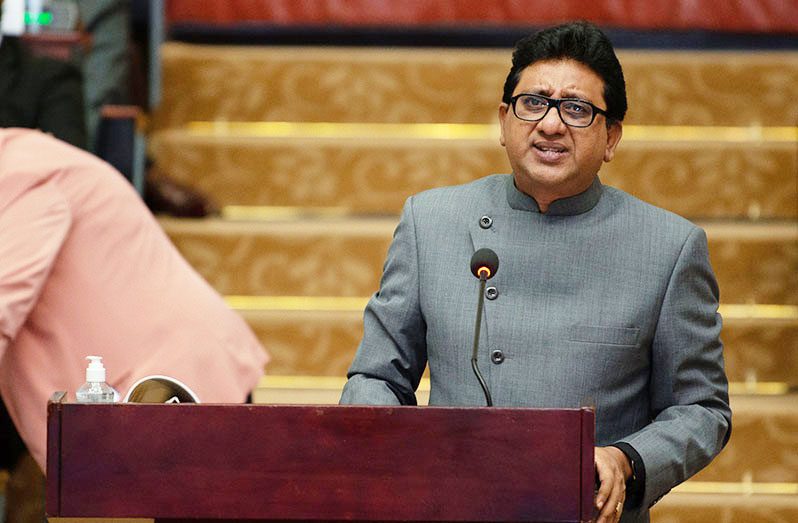IN keeping with Guyana’s continued upward developmental trajectory, the Ministry of Legal Affairs in 2022 will continue to pursue a transformational legislative agenda tailored to equip the country with a modern statutory framework to facilitate its growth and development.
The legislation which the ministry will be pursuing includes the enabling of online transactions in the public sector, a “modern” Arbitration Bill to facilitate commercial dispute resolution and legislation which will see Guyana achieving its goal of becoming the bread basket of the Caribbean, Attorney-General and Minister of Legal Affairs, Anil Nandlall, S.C., said.
“We have to continue to build the legal infrastructure for a modern Guyana and we will continue to reform our archaic statutory framework and remove from it the anachronistic elements of our law and replace them with modern legislation that is geared to meet the developmental agenda of our country,” Nandlall said during his weekly television programme, Issues in the News.
He added: “We can’t develop a country without a modern legal framework, we have to start to move our transactions to e-transaction in government, that by itself requires a series of legislation that will allow for us to do transactions online in the public sector.”
The Attorney-General noted that it is imperative for the country to begin transacting business in the public sector online, such as making payments. This, he noted, requires implementing legislation to lay the foundation for such transactions and disclosed that his ministry will be pursuing same.
Further, taking into consideration disputes which will arise in the commercial arena as Guyana’s oil and gas sector picks up steam, the ministry will be looking to implement a modern Arbitration Bill which was developed by the Caribbean Community (CARICOM).
INTERNATIONAL STANDARDS
The Attorney-General was adamant that he is desirous of Guyana being the first country in the CARICOM region to adopt the bill as it embraces the international principles of arbitration and will set the country on par with international standards.
“So, whenever we have disputes in the oil and gas sector or in the commercial sector at large, we don’t have to necessarily go outside of Guyana to London, Switzerland, Singapore, New York, to resolve these disputes, we are going to be able to do that here,” he said.
He noted that the bill being completed at this juncture by CARICOM is a “wonderful opportunity” and it can be adjusted to meet the exigencies of Guyana’s dynamic society as a report on the bill is also attached.
Arbitration is a form of an Alternative Method of Dispute Resolution (ADR). It is a private procedure, whereby parties involved in a dispute, submit the dispute to one or more arbitrators, mutually agreed upon, and the arbitrator makes a legally binding decision on the matter.
Because of the adversarial nature of the court system, it is usually a last-resort option for the commercial industry and arbitration is extensively preferred, due to its confidential and time-saving nature.
In addition, the Attorney-General disclosed that the government will embark on training of arbitrators as well, which will include members of the legal profession and laymen to give persons the option of choosing.
“This is something that is independent of and in conjunction with the judiciary, because one can choose whether one choose [sic] to do arbitration within the legal system or arbitration extrinsic of the legal system, both options will be made available in the model that we are performing,” he said.
OTHER LEGISLATIONS
For Guyana to realise its potential as the breadbasket of the Caribbean, legislation to see the country meets internationally accepted standards for food processing and export is also being pursued by the Ministry of Legal Affairs.
“In preparation of Guyana developing our food potential to feed the Caribbean– because that remains our primary objective in the agriculture sector–to feed the Caribbean, we now have to build that infrastructure that will allow us to produce and package food and export in accordance with international standards,” Nandlall said.
He noted that the international requirements for the production, processing, packaging and exportation of food are high and the country has to meet those requirements, and the legislation will facilitate the country meeting the requirements.
“That would require, again, us passing legislation to modernise the way that we package food, and the way that we do agriculture, the way that we manufacture our agriculture. So, we have bills like [sic] the Food Security Bill, the Food Safety Bill that we are working on,” he said.
The ministry is also pursuing the upgrading of existing legislation in various sectors such as the Public Health Act, the Mental Health Act, the Domestic Violence Act and the Sexual Offences Act.
A Sexual Harassment Bill, a Condominium Bill and a Bail Bill will also be tabled in the House,
“A lot of investors want to invest in condominiums and a lot of the investors, the operators within the oil and [gas] sector, they have expressed a preference for condominium-style accommodation for their companies, we are going to lay the statutory groundwork and framework for that, that bill is already completed,” Nandlall said.
Since being elected to office on August 2, 2020, the People’s Progressive Party/Civic (PPP/C) Government has embarked on a rigorous agenda to transform Guyana’s archaic legal sector through overruling outdated legislation and crafting a modern legal architecture.



.jpg)









